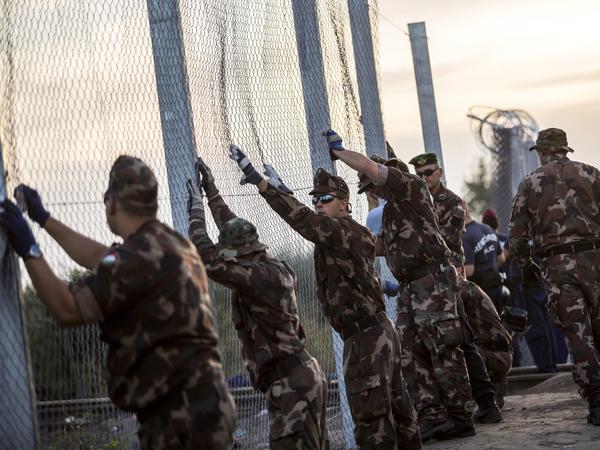Interior Minister Nancy Faeser has announced increased cooperation with the Western Balkan states in reducing irregular migration and organized crime. “We will work even harder together here,” said the SPD politician on Tuesday evening in Berlin after a meeting with departmental colleagues from the Western Balkan states, the EU and Great Britain.
The conference in the Interior Ministry also addressed the return of refugees to other EU states, for whose asylum procedures under the so-called Dublin system, not Germany but actually another EU member state is responsible, the minister continued. “We have discussed this with Greece and also with Italy,” she said.
Representatives from 18 countries, including Italy, France, Austria and the Western Balkan states, were invited to the meeting in Berlin. Germany is not the only country that is currently tightening its migration policy. On Monday, the British Prime Minister Keir Starmer during a visit to Rome, the ultra-right government of Prime Minister Giorgia Meloni is dealing with irregular migration.
According to the Austrian Interior Ministry, cooperation with the Western Balkan partners in the fight against illegal migration and people smugglers is of central importance to the government in Vienna. In recent months, measures to protect the common external borders, to increase returns from the states along the migration routes and, above all, to fight people smugglers have led to “a massive reduction in illegal entries via the Western Balkan route,” it said. This cooperation should be further intensified and expanded.
According to participants, there was agreement at the meeting in Berlin that the fight against people smugglers must be continued in order to stop illegal migration through the Western Balkans region. The so-called status agreements between the EU border protection agency Frontex and non-EU states are also an important element in jointly protecting the EU’s external borders. According to the information, the countries of the Western Balkans already want to prepare for the Reform of the Common European Asylum System (CEAS) which is to be implemented by mid-2026.

© dpa/MTI/Balazs Mohai
The EU is seeing a decline in irregular migration. According to the EU border protection agency Frontex, the number of irregular entries via the Balkan route fell to 14,669 between January and August – 77 percent less than in the same period last year. An offshoot of the Balkan route also runs through the two non-EU countries Serbia and Bosnia-Herzegovina. According to the European Council for Refugees and Exiles (ECRE), the number of refugees attempting to cross the Drina river bordering the two countries has recently increased.
Serbia and Bosnia-Herzegovina are not part of the EU. Serbia borders the EU member state Hungary.
Representatives of Hungary were not present at the meeting in the Berlin Interior Ministry. Hungary currently holds the EU presidency, but is facing Prime Minister Viktor Orban is increasingly being criticized by EU partners. At the beginning of Hungary’s six-month EU presidency in July, Orban launched a “peace mission” for Ukraine, which led him to meet Kremlin chief Vladimir Putin, among others. Then, in the dispute over asylum policy, Orban threatened to send migrants to Brussels in buses. Most recently, he demanded money from the EU for construction work to protect Hungary’s external border. The EU Commission, however, rejected the demand.
